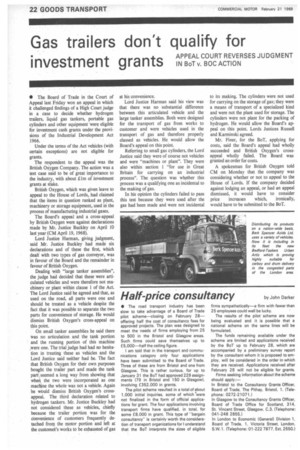Gas trailers don't qualify for
Page 24

If you've noticed an error in this article please click here to report it so we can fix it.
investment grants IN BoT v. BOC ACTION
• The Board of Trade in the Court of Appeal last Friday won an appeal in which it challenged findings of a High Court judge in a case to decide whether hydrogen trailers, liquid gas tankers, portable gas cylinders and other equipment were eligible for investment cash grants under the provisions of the Industrial Development Act 1966.
Under the terms of the Act vehicles (with certain exceptions) are not eligible for grants.
The respondent to the appeal was the British Oxygen Company. The action was a test case said to be of great importance to the industry, with about Lim of investment grants at stake.
British Oxygen, which was given leave to appeal to the House of Lords, had claimed that the items in question ranked as plant, machinery or storage equipment, used in the process of manufacturing industrial gases.
The Board's appeal and a cross-appeal by British Oxygen were against declarations made by Mr. Justice Buckley on April 10 last year (CM April 19, 1968).
Lord Justice Harman, giving judgment, said Mr. Justice Buckley had made six declarations and of these the first, which dealt with two types of gas conveyor, was in favour of the Board and the remainder in favour of British Oxygen.
Dealing with "large tanker assemblies", the judge had decided that these were articulated vehicles and were therefore not machinery or plant within clause 1 of the Act. The Lord Justice said he agreed and that, as used on the road, all parts were one and should be treated as a vehicle despite the fact that it was possible to separate the two parts for convenience of storage. He would dismiss British Oxygen's cross-appeal on this point.
On small tanker assemblies he said there was no articulation and the tank portion and the running portion of this machine were one. The trial judge had had no hesitation in treating these as vehicles and the Lord Justice said neither had he. The fact that British Oxygen for their own purposes bought the trailer part and made the tank part seemed a long way from showing that when the two were incorporated as one machine the whole was not a vehicle. Again he would dismiss British Oxygen's crossappeal. The third declaration related to hydrogen tankers. Mr. Justice Buckley had not considered these as vehicles, chiefly because the trailer portion was for the convenience of customers frequently detached from the motor portion and left at the customer's works to be exhausted of gas at his convenience.
Lord Justice Harman said his view was that there was no substantial difference between this articulated vehicle and the large tanker assemblies. Both were designed for the transport of gas from works to customer and were vehicles used in the transport of gas and therefore properly classed as vehicles. He would allow the Board's appeal on this point.
Referring to small gas cylinders, the Lord Justice said they were of course not vehicles and were "machines or plant". They were also within section 1 -for use in Great Britain for carrying on an industrial process". The question was whether this process was a qualifying one as incidental to the making of gas.
In his opinion the cylinders failed to pass this test because they were used after the gas had been made and were not incidental
to its making. The cylinders were not used for carrying on the storage of gas; they were a means of transport of a speciali7ed kind and were not the plant used for storage. The cylinders were not plant for the packing of hydrogen. He would allow the Board's appeal on this point. Lords Justices Russell and Karrninski agreed.
Mr. Finer, for the BoT, applying for costs, said the Board's appeal had wholly succeeded and British Oxygen's crossappeal wholly failed. The Board was granted an order for costs.
A spokesman for British Oxygen told CM on Monday that the company was considering whether or not to appeal to the House of Lords. If the company decided against lodging an appeal, or had an appeal dismissed, it would have to consider price increases which, ironically, would have to be submitted to the BoT.












































































































